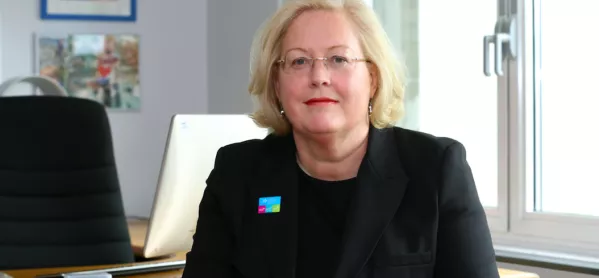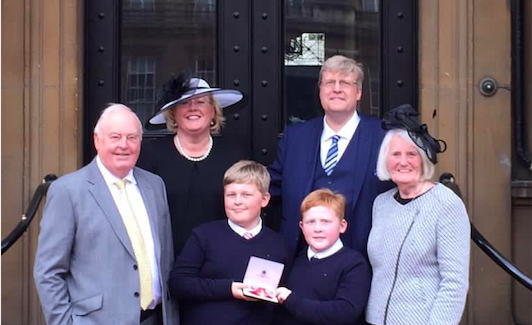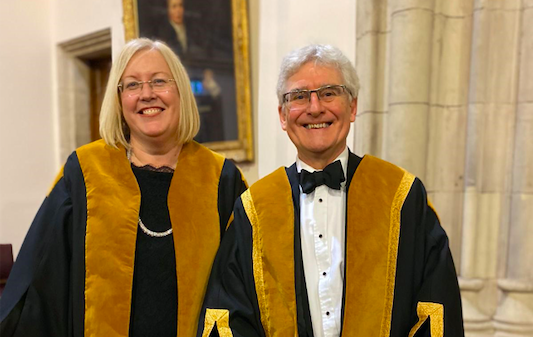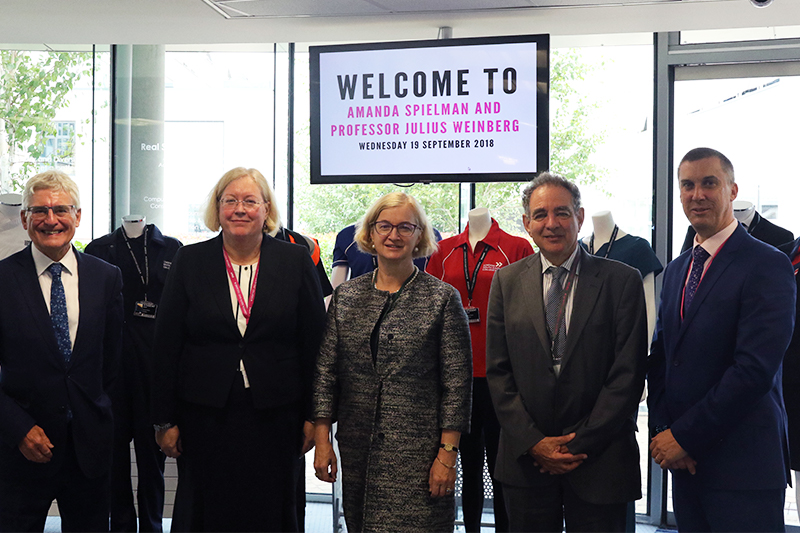- Home
- Leadership
- Staff Management
- Meet Sam Parrett: FE’s leader of the year 2020
Meet Sam Parrett: FE’s leader of the year 2020

“In my early career, I remember wondering if I’ll be one of those people that goes through two or three different colleges, or if I will be one of those principals that stays in one place for a long time. I always thought I’d be in the former, but now I realise I’m going to be the latter. It’s probably because the job that I’m doing today is very removed from the job I was doing 10 years ago,” says Sam Parrett.
“I’ve grown with the college and grown with the opportunities. Running one college with a £20 million turnover is very different to running four colleges that turn over £50 million, and also being the chief executive of a multi-academy trust that turns over £27 million.”
There’s no doubt about: Sam Parrett is quite the further education powerhouse. As chief executive and group principal of the London South East Colleges Group, she leads one of the biggest FE organisations in the country - and does an awarding-winning job of it.
At this year’s Tes FE awards, Parrett was named FE leader of the year - a really special award to receive, she says, not only because of the people who chose her (the esteemed group of Tes Judges), but because of the death of her father, just days later.
“It was my birthday as well on the day of the awards, and my dad died two days after. It was the last thing he knew at 8.30pm on that Friday night. He said, “Well done, love,” so it will be forever special for me,” she says.
“There are other things you do in life, for example. I was delighted to get an OBE, but lots of people get that. Being named leader of the year felt really, really special. I was really touched.”

Food bank Friday: Why we’re launching a festive version
Background: Sam Parrett wins at Tes FE Awards 2020
By Sam Parrett: Why we need to recognise teacher expertise in colleges
A strong work ethic
Parrett’s story began in Leeds, before her family moved south and settled in Dorset. Her parents were entrepreneurs and ran their own business, instilling a strong work ethic in their daughter. When studying for her A levels, she worked 20 hours a week at Marks and Spencers, and while completing her degree, she worked 30 hours a week at John Lewis.
“My parents were quite entrepreneurial and they said that I had to pay for my own university education, so I did that through working really hard. I’ve always had a really strong work ethic, and quite a lot of independence, which has branded me, really,” she says.
Parrett’s first experience of the power of further education wasn’t through her own journey, but that of her then-boyfriend. The pair got the same GCSEs, but while Parrett went on to study her A levels at sixth-form college, he started on a youth training scheme - a decision she says “horrified her”.
It wasn’t long before he switched onto an apprenticeship - and subsequently went on to have a parallel career to Parrett, ending up in education leadership, too. Without that apprenticeship, she says, he wouldn’t have had the same opportunities.
Inspired by what FE could offer people, after finishing her university degree, Parrett went to work at a training provider. There, she helped to deliver the first NVQs in retail, before quickly progressing to work for a training and enterprise council, leading the development of the modern apprenticeship programmes.

‘Cut your teeth moments’
Parrett then went on to work at Bracknell and Wokingham College, as the business development manager. She stayed at the college for six years, completing all of her teacher training at Newbury College while working full-time, and worked her way to assistant principal, with responsibilities for apprenticeships, NVQs, professional and business courses.
“I was really invested, personally, in work-based training and I was already committed to what further education could do in terms of transforming lives in a non-traditional way for people who either haven’t had those educational opportunities or come for second or third chances,” she says.
By 2003, Parrett was given the opportunity to step back from the chalkface and was seconded to the Regional Development Agency. There, she worked on behalf of the colleges in the South East of England and developed a programme called Action for Business Colleges, aimed at getting colleges more adept at working with business - “15 years later, and we’re still talking about this,” she laughs.
After two years at the agency, she realised that she wasn’t an “ivory tower policy person”, and was eager to get back into working within colleges. She was hired as Plymouth College‘s vice-principal for HR and skills - a move that she says was initially a “nightmare”.
“I got the job in November and I started in February, by which time it had a dire Ofsted and was in financial recovery. So within three months of arriving there, the principal and the senior management team had gone - it was one of those ‘cut your teeth’ moments,” she says.
“I had the amazing interim principal and he went on to be an interim turn-around specialist and I really learned a lot from him about priorities, and how you keep morale high when the chips are down, and how to keep the show on the road.”

The first college merger
After five years at Plymouth - and having had two children - Parrett felt ready for a principal role. She and her husband stuck a pin in a map and applied for jobs in that area. And so it was at Bromley College that she stepped into her first principalship.
A few years prior, Bromley had ditched its A-level provision and focused solely on vocational qualifications - this, she says, is what made it feel like the right college for her. However, as with Plymouth, it was not the smoothest start.
“On my third day in the job, the principal of the college next door, Orpington College, asked to see me. He said, ‘My college is really struggling - financially and in quality terms - and if you don’t merge with us, we’re going to merge with Lewisham College.’ I was thinking, ‘Oh my god, I’ve come for this job, I’ve come from Devon to London and I’m going to be out of a job in a year.’”
It seems hard to imagine now, but at the time, college mergers were far from common - but Parrett isn’t someone to shy away from a challenge. She already had the recipe for turning a failing college into a successful one from her time at Plymouth, and set about cooking up success.
Over three years, with her leadership team, Parrett researched the skills gaps in the local area and replaced all of the A-level provision with high-quality vocational provision, introducing courses in hospitality and catering as well as a new science business curriculum. During that time, the college didn’t lose a single member of staff, Parrett says proudly.
“We created a really positive, high-performing aspirational culture that was completely aligned to employee engagement and meeting employer needs, and that’s one of the things that I’m probably most proud of actually,” she says.
“Wherever I’ve gone, we have had highly effective employee engagement and responsiveness. We don’t need fancy data systems to tell us that we’re connected, because we’re connected as people to the businesses in our local community.”
In 2013, the Department for Education gave Parrett an opportunity to expand her group further. She was asked to set up a multi-academy trust - and thought long and hard about it.
“Our sector is littered with examples of colleges taking on things that are not part of their core business or fail because they’re not related to the core of the business,” she says.
“At the time, the government was going through a lot of reform in terms of special educational needs, and so we decided that we would find a connection in our local area between the work we did post-16, in SEN, and our local special schools,” she says.
Today, LSEC has eight schools in its MAT - all of which are special or alternative provision schools.
By the time 2016 came around, other colleges in the vicinity were struggling - and Parrett and her team decided to expand the group further and merge with Bexley and Greenwich College, doing so with that same recipe of success: research, design, development and employer engagement.
“We found out what worked and in spite of all of the challenges around funding, policy change, curriculum change and design, we’ve held on to some basic lessons around strong financial management, a curriculum that is connected to employers and that prepares young people in life, and a college that is connected to its community,” she says.
“The proudest moment in this last year was when we realised that actually, in some regards, we have become more than a college. We’ve become a group, we employ 1,400 people, we turn over nearly £80 million. We’re the third- or fourth-largest employer in our London boroughs, and we sit at tables with the CBI as an employer, as well as a provider. We changed our mission this last year and re-established ourselves as a social enterprise organisation: it’s all about having a positive impact on lives and local communities.”

Being connected to the community
Parrett is prepared for yet more change to come with the impending FE White Paper, but is confident about the future of LSEC. That self-assurance, she says, is from being “totally connected to our local community”.
As well as her leadership role within the college group, Parrett also works with the FE commissioner as a national leader of further education. She says that from what she’s seen, it’s clear that all colleges can be like the blueprint set out in the Independent Commission into the Colleges of the Future.
“What is really clear is that with the right leadership, the right governing bodies and the right stakeholder relations external to the college, all colleges can be like that blueprint. What we need to do more as a sector nationally is learn from those who have done it while also giving people the skills to do it in each local community differently,” she says.
“I hope one of the lessons the government has learned from lockdown has been the autonomy given to local leaders to make decisions based on local circumstances. I hope that in the White Paper there’s a recognition that, as a sector, we aren’t one-size-fits-all. We are a sector where you have to respond to your local circumstances.”
Sharing leadership skills
No one can deny Parrett’s leadership abilities - and she’s determined to share her skills as far and wide as possible.
“When I started out as a principal, I had some really inspiring people who took me under their wing, mentored and supported me. Informally, I’ve tried to do the same for the younger leaders. I also remember the people that didn’t help me, and what that felt like, too. I’ve gone out of my way to mentor and support other people, and I think that’s really critical,” she says.
For the last seven years, Parrett has been working towards her doctorate in her spare time, and now that is finished, she isn’t slowing down. Instead, she’s starting a professional coaching qualification, determined to give quality and much-needed support to those coming into college leadership.
“I think it is really important that those of us who have done it and got the T-shirt share, build networks and support each other. There have been some quite well-documented articles about stress, wellbeing and how important it is that, as leaders, we keep ourselves fit physically and mentally,” she says.
“Those of us in the sector that worked through the stressful times and built resilience, we need to pass that on and support our colleagues so we don’t have any more people leaving the sector for the wrong reasons.”
You need a Tes subscription to read this article
Subscribe now to read this article and get other subscriber-only content:
- Unlimited access to all Tes magazine content
- Exclusive subscriber-only stories
- Award-winning email newsletters
Already a subscriber? Log in
You need a subscription to read this article
Subscribe now to read this article and get other subscriber-only content, including:
- Unlimited access to all Tes magazine content
- Exclusive subscriber-only stories
- Award-winning email newsletters



